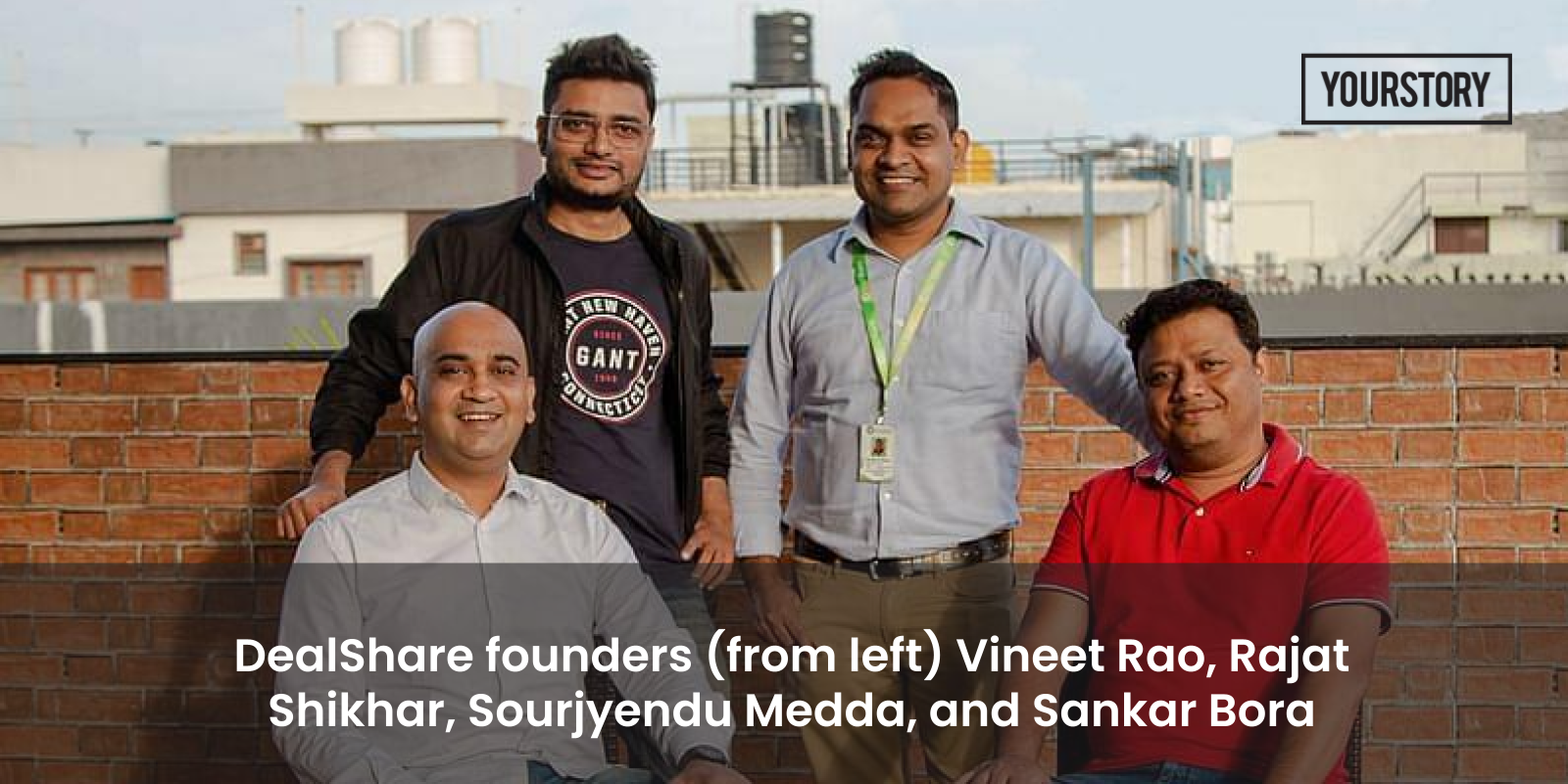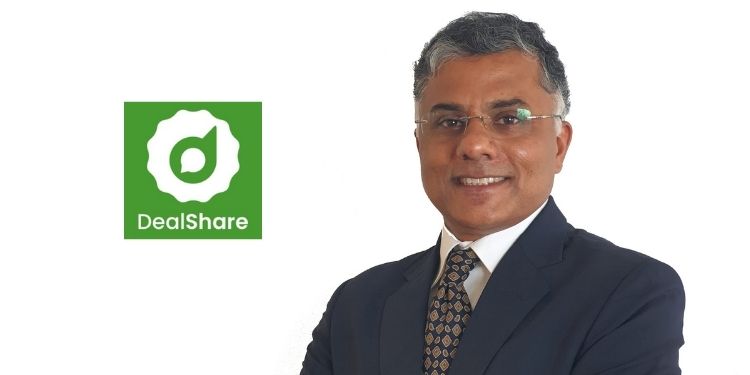DealShare CEO Vineet Rao Resigns, Board to Collaborate in Search for Successor

DealShare CEO Vineet Rao Resigns, Board to Collaborate in Search for Successor
DealShare, a company offering e-commerce solutions, announced on Monday that its CEO, Vineet Rao, has decided to step down from his role. However, he will remain involved with the company, providing guidance and advice to the board. Additionally, Vineet Rao will be assisting in the search and selection process for a new CEO to lead the company.
As of now, the specific reasons for Vineet Rao’s decision to step down have not been disclosed in the press release. It’s possible that he is pursuing other opportunities or that there might be strategic changes or transitions happening within the company that have led to this decision.
Vineet Rao’s continued involvement and support in the company’s future, along with his assistance in finding a new CEO, indicate a smooth and collaborative transition in leadership for DealShare. The company’s board will likely work closely with Rao to ensure a seamless process in appointing a new CEO who can lead the company towards its future goals and growth.
For investors, employees, and stakeholders of DealShare, it will be essential to closely monitor any further announcements or updates regarding the leadership transition and the company’s plans for the future. A new CEO’s appointment and their vision for the company will play a crucial role in shaping DealShare’s trajectory in the competitive e-commerce space.
Vineet Rao’s resignation as CEO of DealShare comes at a critical juncture for the company, as it reportedly undergoes a shift in its growth strategy. The move towards sustainable growth and away from a high-burn model indicates a change in the company’s approach to expansion and profitability.

The sources’ reports suggesting a significant fall in the company’s scale over the past six to eight months raise questions about the reasons behind this decline. Possible factors contributing to the scale reduction could include increased competition in the e-commerce space, changing market dynamics, or challenges in executing the high-burn model effectively.
In the face of these developments, Rao’s decision to step down may have been influenced by several considerations. As the CEO, Rao would have been instrumental in shaping the company’s strategy and overseeing its operations. His resignation might signal that he either believes the company needs a new leadership approach to navigate the current challenges, or he himself might prefer to explore other opportunities that align better with his career goals.
With Rao continuing to support and advise the board during the transition, it appears that the company is taking measures to ensure a smooth leadership change. The board’s active involvement and the search for a new CEO to lead the company’s shift towards sustainable growth will be crucial in determining DealShare’s future trajectory.
For investors, employees, and other stakeholders, closely monitoring the developments and announcements from DealShare in the coming weeks will provide insights into the company’s strategy, leadership direction, and plans to address the scale reduction and achieve sustainable growth in the highly competitive e-commerce market.
DealShare’s statement about its intention to pivot to a hybrid online and offline model reflects the company’s strategic efforts to drive profitable growth and improve its services. The hybrid model, combining both online and offline channels, allows the company to tap into a wider customer base, enhance customer retention, and increase its share of wallet from existing customers.
The move towards a hybrid model aligns with DealShare’s broader business strategy, as the company has been tweaking its approach for some time. In March, the company increased its focus on opening small stores similar to DMart in tier II and III cities. This expansion into physical retail locations complements its existing online presence and provides an additional touchpoint for customers to access its products and services.

The hybrid approach offers several benefits to DealShare. Firstly, it allows the company to leverage the convenience and reach of its online platform to acquire new customers and drive initial sales. Then, by establishing physical stores, the company can create a more personalized shopping experience, foster stronger customer relationships, and potentially increase customer loyalty and repeat purchases.
Furthermore, the hybrid model can help DealShare mitigate certain challenges associated with an exclusively online model, such as last-mile delivery challenges, especially in remote or underserved areas where it operates. By having physical stores, the company can offer pick-up points, enabling customers to collect their orders, thereby reducing delivery costs and time.
DealShare’s recent focus on building a private label portfolio is part of its efforts to diversify revenue streams and drive profitable growth. The company is backed by Alpha Wave, and it aims to achieve up to 25% of its sales from the private label vertical by the end of FY24. Private label products typically offer higher margins compared to third-party branded products, providing an opportunity for DealShare to increase its profitability.
In addition to its focus on private labels, DealShare has made changes to its leadership team. It appointed Saurabh Kishore as the new Chief Technology Officer (CTO) to lead the company’s technology initiatives. The company also brought in Venkatesh Tarakkad as the new Chief Financial Officer (CFO) in May last year. These leadership appointments reflect DealShare’s commitment to strengthening its management team and driving strategic initiatives.
While the company did not disclose its financial numbers for FY23, former CEO Vineet Rao stated that the company is on track to achieve around 20% growth in its topline to approximately Rs 2,300 crore (excluding returns and discounts) for the last fiscal year. In FY22, DealShare recorded significant growth, with its scale increasing over 8X to Rs 1,933 crore. However, the growth came with increased losses, which rose 6.4X to Rs 431 crore during the same period.

The company’s growth trajectory indicates its ambitious expansion plans and its efforts to consolidate its position in the competitive e-commerce and retail landscape, particularly in tier II and III cities. By leveraging private labels and optimizing its technology and financial operations, DealShare aims to strengthen its market position and achieve sustainable growth and profitability in the coming years.
DealShare, a company offering e-commerce solutions, announced on Monday that its CEO, Vineet Rao, has decided to step down from his role. However, he will remain involved with the company, providing guidance and advice to the board. Additionally, Vineet Rao will be assisting in the search and selection process for a new CEO to lead the company.
As of now, the specific reasons for Vineet Rao’s decision to step down have not been disclosed in the press release. It’s possible that he is pursuing other opportunities or that there might be strategic changes or transitions happening within the company that have led to this decision.
Vineet Rao’s continued involvement and support in the company’s future, along with his assistance in finding a new CEO, indicate a smooth and collaborative transition in leadership for DealShare. The company’s board will likely work closely with Rao to ensure a seamless process in appointing a new CEO who can lead the company towards its future goals and growth.
For investors, employees, and stakeholders of DealShare, it will be essential to closely monitor any further announcements or updates regarding the leadership transition and the company’s plans for the future. A new CEO’s appointment and their vision for the company will play a crucial role in shaping DealShare’s trajectory in the competitive e-commerce space.

Vineet Rao’s resignation as CEO of DealShare comes at a critical juncture for the company, as it reportedly undergoes a shift in its growth strategy. The move towards sustainable growth and away from a high-burn model indicates a change in the company’s approach to expansion and profitability.
The sources’ reports suggesting a significant fall in the company’s scale over the past six to eight months raise questions about the reasons behind this decline. Possible factors contributing to the scale reduction could include increased competition in the e-commerce space, changing market dynamics, or challenges in executing the high-burn model effectively.
In the face of these developments, Rao’s decision to step down may have been influenced by several considerations. As the CEO, Rao would have been instrumental in shaping the company’s strategy and overseeing its operations. His resignation might signal that he either believes the company needs a new leadership approach to navigate the current challenges, or he himself might prefer to explore other opportunities that align better with his career goals.
With Rao continuing to support and advise the board during the transition, it appears that the company is taking measures to ensure a smooth leadership change. The board’s active involvement and the search for a new CEO to lead the company’s shift towards sustainable growth will be crucial in determining DealShare’s future trajectory.
For investors, employees, and other stakeholders, closely monitoring the developments and announcements from DealShare in the coming weeks will provide insights into the company’s strategy, leadership direction, and plans to address the scale reduction and achieve sustainable growth in the highly competitive e-commerce market.

DealShare’s statement about its intention to pivot to a hybrid online and offline model reflects the company’s strategic efforts to drive profitable growth and improve its services. The hybrid model, combining both online and offline channels, allows the company to tap into a wider customer base, enhance customer retention, and increase its share of wallet from existing customers.
The move towards a hybrid model aligns with DealShare’s broader business strategy, as the company has been tweaking its approach for some time. In March, the company increased its focus on opening small stores similar to DMart in tier II and III cities. This expansion into physical retail locations complements its existing online presence and provides an additional touchpoint for customers to access its products and services.
The hybrid approach offers several benefits to DealShare. Firstly, it allows the company to leverage the convenience and reach of its online platform to acquire new customers and drive initial sales. Then, by establishing physical stores, the company can create a more personalized shopping experience, foster stronger customer relationships, and potentially increase customer loyalty and repeat purchases.
Furthermore, the hybrid model can help DealShare mitigate certain challenges associated with an exclusively online model, such as last-mile delivery challenges, especially in remote or underserved areas where it operates. By having physical stores, the company can offer pick-up points, enabling customers to collect their orders, thereby reducing delivery costs and time.
DealShare’s recent focus on building a private label portfolio is part of its efforts to diversify revenue streams and drive profitable growth. The company is backed by Alpha Wave, and it aims to achieve up to 25% of its sales from the private label vertical by the end of FY24. Private label products typically offer higher margins compared to third-party branded products, providing an opportunity for DealShare to increase its profitability.
In addition to its focus on private labels, DealShare has made changes to its leadership team. It appointed Saurabh Kishore as the new Chief Technology Officer (CTO) to lead the company’s technology initiatives. The company also brought in Venkatesh Tarakkad as the new Chief Financial Officer (CFO) in May last year. These leadership appointments reflect DealShare’s commitment to strengthening its management team and driving strategic initiatives.

While the company did not disclose its financial numbers for FY23, former CEO Vineet Rao stated that the company is on track to achieve around 20% growth in its topline to approximately Rs 2,300 crore (excluding returns and discounts) for the last fiscal year. In FY22, DealShare recorded significant growth, with its scale increasing over 8X to Rs 1,933 crore. However, the growth came with increased losses, which rose 6.4X to Rs 431 crore during the same period.
The company’s growth trajectory indicates its ambitious expansion plans and its efforts to consolidate its position in the competitive e-commerce and retail landscape, particularly in tier II and III cities. By leveraging private labels and optimizing its technology and financial operations, DealShare aims to strengthen its market position and achieve sustainable growth and profitability in the coming years.



